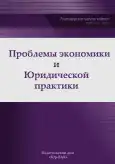Compensation for Moral Damage: Theory, Problems of Law Enforcement Practice and Ways of Overcoming them
- Authors: Afanasyev I.V.1, Morozov N.A.1
-
Affiliations:
- Financial University under the Government of the Russian Federation
- Issue: Vol 19, No 3 (2023)
- Pages: 75-81
- Section: Private Law (Civil) Sciences
- URL: https://journal-vniispk.ru/2541-8025/article/view/145591
- EDN: https://elibrary.ru/FLVVAP
- ID: 145591
Cite item
Abstract
The article attempts a comprehensive analysis of the institute of compensation for moral damage. The task of this study is, firstly, to clarify and explain the philosophical essence of moral damage as a result of violation of individual rights. Secondly, to clarify the reasons for existing problems of the institute of compensation for moral damage in the domestic legal order at different levels: object, subject, as well as ideology. Analysis of court decisions shows that there are two directions in the activity of law enforcers on the issues of compensation for moral damage: expansion of the scope of legal assessment, as well as assignment of proportional amounts of physical and moral suffering. The development of the institute of compensation for moral harm is going on successfully. At the same time, the issue of the amount of compensation payments is a vulnerable point in the domestic legal order. Examples of court decisions demonstrate the bias of sums in relation to both suffering and socio-economic conditions in the Russian Federation. Also, the range of tasks includes finding out the ways of increasing the amounts of compensation. As a result, the following most common in the doctrine proposals were identified. The first way—increase in the amount within judicial discretion—according to the author is not possible in the current situation. The second, related to the formulaic method of calculating compensation, has only a doctrinal basis. At the same time the judicial practice contains exceptional court decisions in which the studied methods of calculation of compensation for moral damage appeared. The authors emphasize the importance of this direction as an additional way to eliminate the problem. The main, in his opinion, can be the activity of the Supreme Court of the Russian Federation, aimed at developing its own political and legal approach to determining the amounts of compensation. The conducted analysis of a number of decisions of the supreme judicial body has shown the conditions under which its activities may have favorable practical results.
Full Text
##article.viewOnOriginalSite##About the authors
Ilya V. Afanasyev
Financial University under the Government of the Russian Federation
Author for correspondence.
Email: ivafanasev@fa.ru
SPIN-code: 6869-0985
Cand. Sci. (Law), Associate Professor of the Department of Legal Regulation of Economic Activity of the Faculty of Law
Russian Federation, MoscowNikolay A. Morozov
Financial University under the Government of the Russian Federation
Email: morozov20030512@gmail.com
Faculty of Law
Russian Federation, MoscowReferences
- Gambarov Ju.S. Civil Law. General part. M., 2003. —796 p.
- Guseva I.I., Zubkov V.N. New Approaches to the Methodology for Determining the Amount of Compensation for Moral Damage in Connection with Damage to the Health and Life of Citizens» // Russian Justice. 2019. № 1. P. 62–65.
- Civil law: textbook: in 4 vols. Ed: Suhanov E.A. Vol.3. M.: Statute, 2020. —480 p.
- Kant I. Anthropology from a Pragmatic Perspective. —СПб.: Science, 1999. —471p.
- Karapetov A.G. The Struggle for Judicial Recognition in European and American Law. M.: Statute, 2011. —308 p.
- Kel'zen G. The doctrine of pure law. SPb.: «Aleph-Press», 2015. —542 p.
- Iering R. fon. The Purpose in Law // Selected Works: In 2 vols. Vol. I. SPb., 2006. —616 p.
- Nersesjanc V.S. The Philosophy of Law. M.: INFRA-M, 1997. —652 p.
- Nikol'skij, N. V. On some aspects of determining the amount of moral damage for causing harm to the health and life of citizens / N. V. Nikolsky // Legal regulation of economic activity. LREA. —2022. —№ 1. —P. 39–44. —EDN VEDMKQ.
- Pokrovskij I.A. The basic problems of civil law. M: Statute, 2020. —351 p.
- Sobachkin A. S. New Resolution of the Plenum of the Supreme Court of the Russian Federation on Compensation for Moral Damage: Analysis of Certain Provisions // Legal Bulletin. —2023. —Vol. 8, № 1. —P. 97–103. —EDN GLFQXT.
- Cherkunova A.V. «Methodology for Calculating Compensation for Moral Damage. N. Novgorod: O.V. Gladkov’s Publishing House, 2010. P. 348–351.
- Jerdelevskij A.M. Moral Damage and Compensation for Suffering. M., 1998. —188p.
- Jerdelevskij A.M. On Determining the Amount of Compensation for Moral Damage // Economy and Law. —2020. —№ 2(517). —P. 41–47.
Supplementary files








